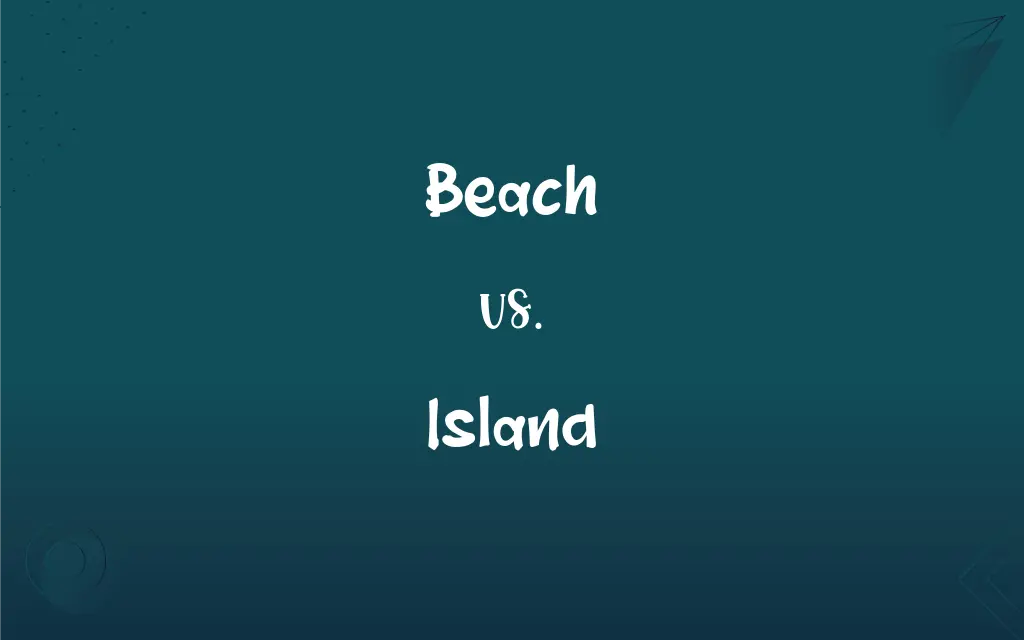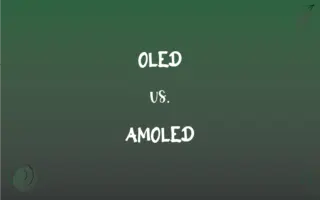Beach vs. Island: What's the Difference?
Edited by Aimie Carlson || By Harlon Moss || Published on December 21, 2023
A beach is a sandy, pebbly, or rocky shore beside a body of water; an island is a landmass surrounded by water.

Key Differences
A beach is a natural landform along the coast of an ocean, sea, lake, or river, typically characterized by sand, pebbles, or rocks. An island, in contrast, is an entirely surrounded landmass by water, which can have its own beaches, forests, and ecosystems. Beaches are parts of the land's edge, whereas islands are distinct landforms in themselves.
Beaches are known for their recreational and aesthetic value, often visited for activities like sunbathing, swimming, and surfing. Islands, however, can range from uninhabited natural preserves to densely populated urban areas, offering a wide range of environments from tropical paradises to rugged, remote outposts.
The formation of a beach involves the accumulation of sediment along the shore, often transported by tides and waves. Islands can be formed through various geological processes, such as volcanic activity, coral reef buildup, or the rising of the ocean floor. Thus, their genesis and composition differ significantly.
Environmental impact on beaches can include erosion and pollution, whereas islands face challenges like rising sea levels, habitat destruction, and isolation-related issues. The ecological dynamics of a beach are closely tied to its adjacent water body, while islands have more complex ecosystems due to their isolation.
A beach is a coastal feature that can exist as part of an island or a continent, offering a specific kind of landscape and recreational space. In contrast, an island is a broader concept representing a self-contained landmass, which can host a variety of landscapes, including beaches.
ADVERTISEMENT
Comparison Chart
Location
Edge of land adjoining water
Landmass completely surrounded by water
Formation
Accumulation of sand, pebbles, or rocks
Geological activities like volcanic eruptions
Size
Variable, usually part of a larger landmass
Can range from very small to very large
Ecosystem
Limited to coastal flora and fauna
Diverse, can include forests, mountains, etc.
Human Usage
Primarily recreational
Can be inhabited, used for resources, or remote
ADVERTISEMENT
Beach and Island Definitions
Beach
A beach is a natural, often sandy, coastline.
The beach stretched for miles, untouched by development.
Island
An island is a solitary habitat within a body of water.
The bird sanctuary was located on a remote island.
Beach
A beach is a pebbly or rocky area beside a body of water.
The children collected shells along the rocky beach.
Island
An island is a piece of land surrounded by water.
We took a boat to a small island in the lake.
Beach
A beach is a landform alongside a body of water used for leisure.
The beach was crowded with tourists enjoying water sports.
Island
An island is an isolated geographical area.
The inhabitants of the island lived a self-sufficient lifestyle.
Beach
A beach is a gently sloping shoreline.
The gentle waves lapped at the beach's edge.
Island
An island is a landform with distinct boundaries set by water.
The map showed numerous tiny islands scattered across the ocean.
Beach
A beach is a sandy shore beside a sea or ocean.
We spent the day relaxing on the sunny beach.
Island
An island is a landmass completely isolated by water.
The island had its own unique ecosystem.
Beach
The shore of a body of water, especially when sandy or pebbly.
Island
Abbr. Isl. or Is. or I. A landmass, especially one smaller than a continent, entirely surrounded by water.
Beach
The sand or pebbles on a shore.
Island
An unattached kitchen counter providing easy access from all sides.
FAQs
Can islands have beaches?
Yes, islands can have their own beaches along their coastlines.
What is a beach?
A beach is a sandy, pebbly, or rocky shoreline beside a body of water.
How is an island formed?
An island can be formed through volcanic activity, coral reef growth, or other geological processes.
Are all beaches sandy?
No, beaches can also be rocky, pebbly, or made up of other materials.
How do human activities impact beaches?
Human activities can lead to pollution, erosion, and habitat destruction on beaches.
Are beaches important for the environment?
Yes, beaches play a crucial role in coastal ecosystems and provide habitat for wildlife.
Do islands always have people living on them?
No, some islands are uninhabited, while others have large populations.
Can an island be a country?
Yes, some islands are independent countries, like Iceland or Japan.
What is beach erosion?
Beach erosion is the removal of beach materials by waves, tides, or human activities.
What is the largest island in the world?
Greenland is currently the world's largest island.
Are there freshwater islands?
Yes, islands can be found in lakes and rivers as well as in seas and oceans.
What is an archipelago?
An archipelago is a group or chain of islands clustered together in a sea or ocean.
Are islands always tropical?
No, islands exist in various climates, from tropical to polar regions.
Can a beach be artificial?
Yes, some beaches are artificially created or enhanced by humans.
Can beaches disappear?
Yes, beaches can disappear due to erosion, sea-level rise, or development.
Do all beaches have waves?
No, some beaches, especially in sheltered areas, have very calm waters with minimal waves.
What activities are common on a beach?
Common activities include sunbathing, swimming, and beach sports.
How do islands affect climate?
Islands can influence local climate patterns, often having unique microclimates.
What is the purpose of a beach?
Beaches serve various purposes, including recreation, tourism, and habitat.
How are islands important for biodiversity?
Islands often have unique species and ecosystems, contributing to global biodiversity.
About Author
Written by
Harlon MossHarlon is a seasoned quality moderator and accomplished content writer for Difference Wiki. An alumnus of the prestigious University of California, he earned his degree in Computer Science. Leveraging his academic background, Harlon brings a meticulous and informed perspective to his work, ensuring content accuracy and excellence.
Edited by
Aimie CarlsonAimie Carlson, holding a master's degree in English literature, is a fervent English language enthusiast. She lends her writing talents to Difference Wiki, a prominent website that specializes in comparisons, offering readers insightful analyses that both captivate and inform.































































